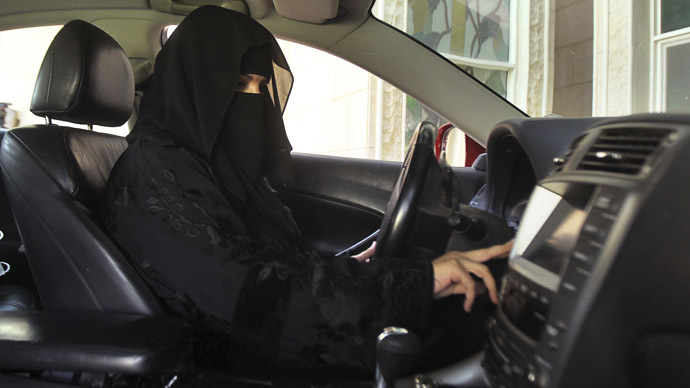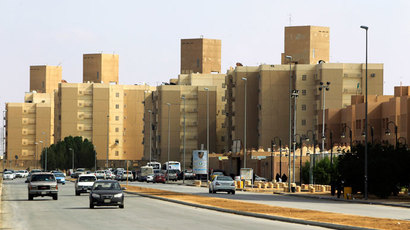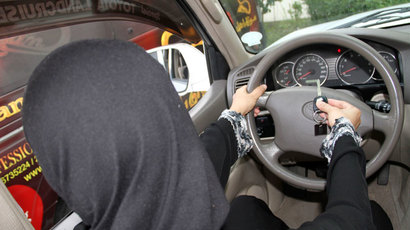Crashing the ban: Saudi Arabian women buckle up for social change

Riyadh is gearing up for a different sort of “road rage” Saturday as women get behind the wheel to challenge a de-facto ban on female car drivers. Women are defying authoritarian cyber-dissident laws that forbid online support for protests.
As this Arab monarchy of some 30 million people slowly opens the
window of opportunity for its women, Saudi females now seem more
inclined to run the red light, so to speak, on other
restrictions, including unwritten rules that ban them from
driving.
This has prompted some women to participate in a motorized
protest on Saturday to challenge the ruling of Muslim clerics,
those behind-the-scene wielders of hefty influence over the
kingdom’s monarchy who argue that women driving cars is a
violation of Sharia law. Some 30 videos of women being filmed
driving have already been uploaded to the 'October 26" YouTube
channel.
In total, more than 60 woman are thought to have taken part,
according to activists keeping track of videos and phone
messages. However, the number is not yet verifiable.
Police checkpoints have been set up in some areas of Riyadh,
according to Reuters witnesses. The agency added that there
seemed to be more traffic patrols than usual on the capital's
roads.
Although not quite on the same level as the hand wringing that
greeted the arrival of the anti-pregnancy “pill” in the West back
in the 1970s, clerics warn that "licentiousness and
lewdness" will spread if women acquire the freedom to drive.
A top cleric sparked huge controversy last month when he said
that medical studies proved that driving a car damages a woman's
ovaries, sparking a satirical song which was also uploaded on the
day of 'protest driving'.
Demonstrations are illegal in Saudi Arabia, where the al-Saud family has held a firm grip on power since 1932. The country’s first significant protest in favor of women drivers was held in 1995. Some 50 women who took to their cars in that campaign were imprisoned for 24 hours and had their passports confiscated. Others lost their jobs.
In June 2011, dozens of women drove in several cities to protest the arrest of a woman after she posted a video of herself driving. Two months later, a woman found guilty of driving received a sentence of 10 lashes. However, the sentence was overturned in April 2012.
On Tuesday, 200 Muslim clerics and preachers assembled at the Saudi Royal Court, which is the chief executive office of the king, to protest against the campaign in support of women driving, according to Saudi news website www.sabq.org.
"If those behind the conspiracy of women driving approach the
house from the back, the sheikhs (will arrive) through the front
doors," said Sheikh Nasser bin Salman al-Omar,
secretary-general of the League of Muslim Scholars, the website
reported.
Police checkpoints are visible in some parts of Riyadh, witnesses
told Reuters, and there appeared to be more traffic patrols than
usual on the streets of the capital.
Meanwhile, activists have already posted a video of a woman -
identified as May Al Sawyan - driving a car in Riyadh, AP
reported. She is seen wearing sunglasses and her hair is covered
by the headscarf traditionally worn by Saudi women.
Online supporters beware
This year, organizers of the protest, in an effort to attract
more participants to their cause, are taking to the internet to
popularize the event. Popular social media sites, including
Twitter and Facebook, have been used to bring more women on board
the campaign.
Activists say they have received over 16,000 signatures on an
online petition in favor of the change.
These developments have not escaped the notice of the
authorities.
Friday's issue of the Arab newspaper Al-Hayat quoted Saudi
Interior Ministry spokesman Turki al-Faisal as saying
“cyber-dissident laws” could be enforced against anyone
supporting the campaign.

In Saudi Arabia, where public beheadings are still employed for
murder and other serious crimes, anybody found guilty of
signaling their support of the demonstration could be slapped
with five-year prison sentences and hefty fines, Marwan al-Ruwqi,
a Saudi consultant on cyber laws, was quoted as saying.
At the same time, however, opponents of the campaign are also
taking advantage of social media to attack women activists.
The London-based rights group Amnesty International said the main
website of the campaign, oct26driving.org, was hacked early
Friday and replaced with the message: "End the leadership of
Saudi women."
Curb on driving and freedom
The irony of Saudi Arabia’s implicit ban on female drivers is
that the women who are fighting for their right to curse and
swear in traffic jams have already received international driving
licenses abroad – but only after gaining permission to hop on a
commercial jet from a male “guardian.”
Under Saudi law, every adult female is required to have a male
relative as her guardian, who is legally entitled to make a
number of decisions on behalf of the woman, including permission
to travel, study and work.
Meanwhile, any step forward that women in Saudi Arabia are
acquiring – which includes the right to vote and participate in
municipal elections in 2015 – seems to move back two steps by the
refusal to let women drive a car.
As Saudi-born writer and journalist Wajeha Al-Huwaider, one of
the Arab world's best-known feminists, explained: "In a world
of technology, rapid globalization and continuous international
challenges, improving the lot of Saudi women and mobilizing them
is no longer a matter of choice and luxury. It is a
necessity.”
Saudi officials must improve its efforts to remove the “fear
from the hearts of the women” so they can participate in the
building of society, she added.

The cost of the ban on female drivers is also cited as a reason
for the campaign, as families are forced to rely on chauffeurs to
accomplish the simplest errands.
However, there have been some notable advances for Saudi women
under King Abdullah. In addition to winning the right to vote, as
well as participate in municipal elections, 30 women have been
granted seats in the 150-member Shura Consultative Council.
Saudi Arabia remains the only country in the world that forbids
women from driving, and judging by recent events, that ruling may
be in place for some time: a proposal by three of the new women
delegates in the council to open discussion on the driving ban
was rejected outright by the council’s male majority.














